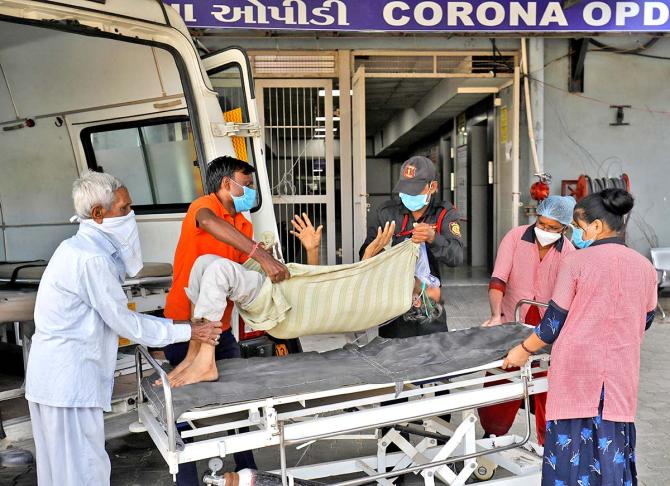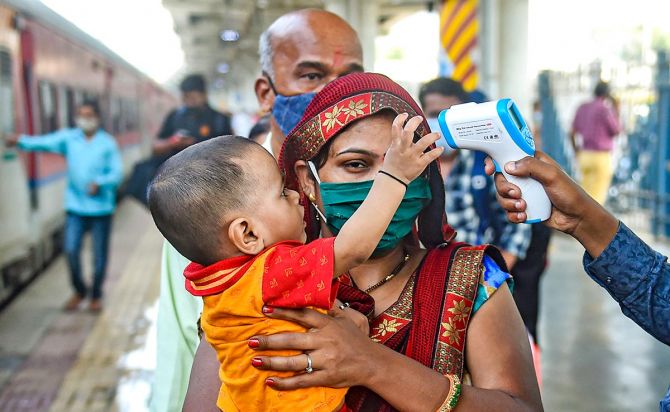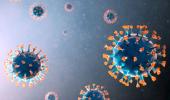'The virus is constantly, constantly, making mistakes when it replicates.'
'When the virus has accumulated enough mistakes, then it becomes now a variant and it behaves differently.'

The larger the playing field you give the COVID-19 virus to perfect its game, the more variants arise, some much more lethal than their predecessors.
When India's first wave died down, India began socialising and gathering in numbers way more than it needed to, especially since most of us were not yet vaccinated.
These social events and huge gatherings, that we felt we had to have, even in the midst of the worst epidemic the world has seen in a hundred years -- where social distancing and masks were barely evident -- gave The Virus fresh vistas and spacious new turf or playgrounds to happily run amok in.
And new, more zealous variants of the COVID-19 virus were born.
We can blame this nasty variant.
But we must remember that we spawned it.
And when the second wave dies down -- hopefully very soon -- we need to use all our resources and vast stores of wisdom to prevent the virus giving birth to more variants and to stave off a third wave.
Dr Priya Sampathkumar in Part IV of her interview to Vaihayasi Pande Daniel/Rediff.com very simply explains how variants come about and how COVID-19 infections pass around.
An infectious disease and critical care specialist working at Mayo Clinic, Dr Sampathkumar trained at CMC Vellore, Tamil Nadu, and at Mayo Clinic and has been tending to the COVID-19 affected since early last year. She is also occupied with helping India survive COVID-19 through her work with the India COVID SOS Mission.
She imparts invaluable information on the disease on covidindiatreatment.com

There are a lot of things we don't understand about the second wave and the reasons for how it took off the way it did.
One of the reasons is the reckless socialising and mass spreader events. Someone I know had a large multiple-family gathering and they all started going down with COVID-19. But there was a difference in time between the sets of cases between families.
Is it possible that if a room full of people meet, there can be a bit of a gap of even 14-15 days between when COVID-19 jumps from one set of people to the next set, who all met?
No. So typically, the incubation period is five to seven days. The maximum is about 14 days.
If they went to a group gathering, and they did not have symptoms within that first 14 days, then they didn't get it from that event.
But I think that there's so many sources and if they were stupid enough to go to one group gathering, they probably went to another one.
It cannot be that that one person is asymptomatic, and therefore the COVID-19 infectivity chain continues, because you don't know if one person is asymptomatic in the middle?
Yes, so that can certainly happen. So, let's say there are A, B,C, D, E people at a gathering. A is infected and can pass it on to B and now B and E get together for lunch, B might be asymptomatic, but could pass it on to E, and that could happen.
But if you had no other contact with that group, your incubation period is only a max of 14 days. So, they didn't get it at that event. But it could have happened that, they met again and someone transmitted it to them.

Some days ago, a specialist told me that they were more worried about the South African variant, the Brazil variant and the fact that people have been careless about maintaining COVID-19-appropriate behaviour, rather than any Indian variant.
When you think about variants, they arise simply because of our stupidity.
The virus is constantly, constantly, making mistakes when it replicates. And that's just a function of the virus. When the virus has accumulated enough mistakes, then it becomes now a variant and it behaves differently.
These variants are arising every day. The more number of people infected, the higher the rate of variant rise (variant creation). That's what's driving this.
When you have hundreds and thousands of cases, then that variant -- it's natural selection -- the weak variants die, the strong variants, the ones that are able to have some survival advantage get selected out.
The fact that this is more infectious, has made, again, the number of cases skyrocket, and the more people have it, again, the more the ability of the virus to change.
So, we did this to ourselves. We weren't doing enough testing, and we assumed that COVID-19 was no longer such a big deal.

So, the Indian variant could be more dangerous than then Brazil and South Africa variants?
Yes, it's more dangerous, definitely, because of the sheer numbers of cases. And it appears to be at least as infectious as the UK variant. The South Africa and the Brazil variant seem to have pretty much been contained for the most part in those regions (this interview was conducted before the new COVID-19 variant B.1.1.529, was detected in South Africa on November 23, 2021). They made their way to the US. But again, because of testing and identifying them, we've managed to contain them in the US.
- PART I: 'Mucor is very scary'
- PART II: Why the Very Young are Dying
- PART III: Sputnik vaccine shows 92% efficacy
Feature Presentation: Ashish Narsale/Rediff.com










